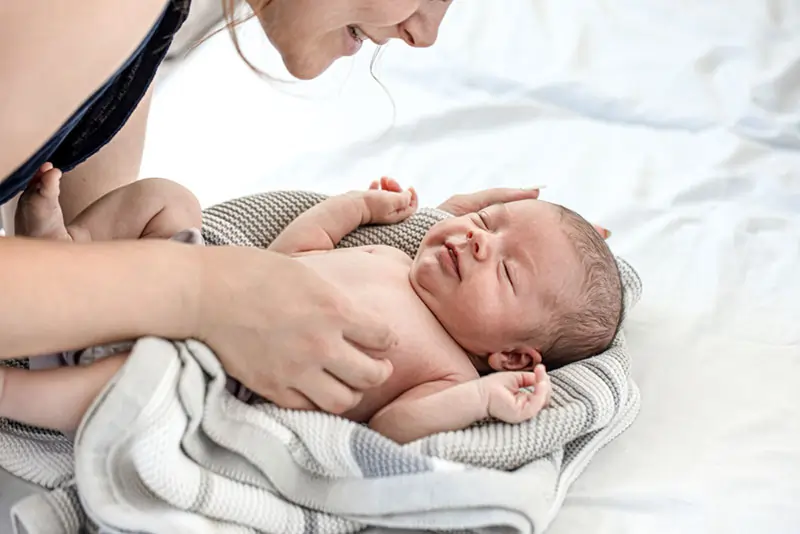5 Important Steps Of Immediate Newborn Care

So, you just gave birth – congratulations! As you hold your baby for the first time, you feel an intense sense of joy and relief but you also feel overwhelmed at how tiny and delicate the baby looks. At that point, you are probably wondering what is happening now and how to take care of this tiny human who is now completely your responsibility.
If you are giving birth at a hospital, then you don’t need to worry that much. Doctors and nurses will swoop in to handle all the critical details so you can focus on bonding with your little one.
Over the next few hours and days, the medical staff will monitor your baby closely to make sure they’re adjusting well to life outside the womb. They’ll check vital signs like temperature, heart rate, and breathing. Any concerns you have regarding baby care or breastfeeding will also be addressed right away.
Before you head home, the staff will also show you the basics of newborn care – like feeding, bathing, and diapering. But you can also go through this article to get an idea about what to expect at the hospital after birth and to know about essential newborn care.
Immediate and Essential Newborn Care
Once your baby enters the world, the real work begins. The experience of giving birth to a baby is different for everyone. However, there are certain steps followed by doctors and nurses in the delivery room and in the first 24 hours to make sure that the newborn and the newborn is healthy and doing well. These steps stay the same in most cases. Read on to know what immediate and essential newborn care you can expect at the hospital.
Essential Newborn Care in the delivery room
Within the first minute, the umbilical cord is clamped and cut. Your baby is then dried, weighed, and given an APGAR test to assess their heart rate, breathing, muscle tone, reflexes and skin color. If there are any issues, the medical team provides respiratory support.
To maintain body temperature, your baby is wrapped in a warm blanket and sometimes given a knit cap. Then if the baby is breathing well, they are usually placed skin-to-skin on your chest, allowing for an opportunity to breastfeed. This early skin-to-skin contact is critical for bonding, breastfeeding, and regulating body temperature.
Monitoring Vital Signs
World Health Organization (WHO) recommends that new mother stay at the hospital for around 24 hours after giving birth. During this period, the hospital staff will closely monitor you and your baby’s health and provide a few essential care.
The medical team will closely monitor your newborn’s temperature, heart rate, breathing, and oxygen levels. They’ll place monitors on their body to track vital signs and make sure everything remains stable and normal during the first hours of life.
Administering Medications
Your baby will receive eye ointment to prevent infection, vitamin K to aid blood clotting, and a hepatitis B vaccine. The medical staff will also draw a small amount of blood to screen for conditions like hypothyroidism or cystic fibrosis.
Keeping Baby Warm
Newborns cannot regulate their own body temperature, so keeping them warm is critical. They’ll be placed under radiant warmers or in incubators. Skin-to-skin contact, also known as kangaroo care, with a parent is one of the best ways to keep a baby warm while also promoting bonding and breastfeeding.
Feeding Support
Whether breastfeeding or bottle feeding, the hospital staff will provide guidance and support to ensure your baby is feeding properly before going home. For breastfeeding, a lactation consultant can help get you started and troubleshoot any challenges. If you are planning on bottle feeding your baby, make sure to ask for recommendations from your doctor or nurse on the best baby food out there.
Caring for Your Newborn at Home: Tips for the First Weeks
Now that you’ve brought your precious newborn home from the hospital, it’s time to establish a routine to keep them healthy, happy, and thriving. Here are some essential tips for caring for your baby during the critical newborn stage.
Feed on demand
Newborns need to eat every 2-3 hours. Look for feeding cues like lip smacking or rooting, and feed them whenever they seem hungry. Breastfeed or bottle feed, whichever you prefer. Don’t follow a strict schedule, just make sure they get enough wet diapers.
Prioritize sleep
Aim for your newborn to sleep 14-17 hours a day. Establish a calming bedtime routine, like a bath followed by a book or lullaby. Put them to sleep on their back in a bare crib. Sleep when the baby sleeps, and take shifts with your partner at night. Lack of sleep can lead to postpartum depression, so make rest a top priority.
Monitor diapers
Newborns go through 10-12 diapers a day. Track wet and dirty diapers to ensure your baby is feeding well and digesting properly. Call your pediatrician if you notice any decrease in urination or changes in stool.
Wrapping Up!
Caring for a newborn can be exhausting, but also rewarding. Reach out for help from loved ones, take time for yourself, follow your baby’s cues, and enjoy this special time. The first weeks fly by, so soak in the snuggles and capture the memories. With love and patience, you’ll get through it!
Author Bio: With 5 years of experience in the field, Emma Brown is an online entrepreneur by profession and a passionate blogger and content writer. She loves to write content about Pets, Travel, Entertainment, fashion, and many more. She has experience at the Pets Magazine, Essay Writing Guides, Dream and travel, The bitcoin Magazine

